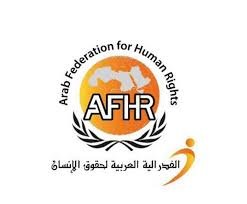Geneva – Qatar’s violations for human rights were discussed during a conference held Friday in Geneva titled “Qatar: State of Oppression and Torture”.
Several testimonials were heard during the conference for a number of cases.
The conference, organized by the Arab Federation for Human Rights (AFHR), was presented by several human rights officials, including General Coordinator of the Arab Federation for Human Rights Sarhan Sadi, and President of the Arab Organization for Human Rights Abdel Rahman Nofal.
One of the participants in the conference described the situation of foreign labor in her speech as “very difficult”. She added that the Qatari government does not take any safety measures and forces them to work for long hours, as they don’t pay them salaries as a punishment in case they decided to refuse doing anything.
”The labor law needs major reforms,” she said, adding that the Qatari government must stop violating the law.
A member of the board of directors of the Democracy Society for Human Rights, Iman Kabany, said during the conference that the Qatari people have huge fears regarding the continuing violation of the human rights taking place in the country.
“Qatari pilgrims were banned from traveling to Saudi Arabia to do their religious rituals, which was completely unacceptable,” Kabany said during her speech.
Furthermore, Kabany added that the well-known Mona al Sulaiti was pursued and threatened by Qatari security forces, along with more politicians and public figures.
Earlier on Friday, many Qatari people expressed their rage at the ruling regime’s policies via Twitter’s trending hashtag “I’m Qatari and represented by the opposition.” It reflects the anger Qataris feel as a result of the spread of foreign troops in Doha and other Qatari cities, amid a crisis with four Arab countries since June 5.
A delegation from the Arab Federation for Human Rights (AFHR) headed by the Federation chairman, Ahmed El Hamly, submitted its report, which refute the claims of the National Human Rights Committee (NHRC) in Qatar, to the chief of the National Institutions and Regional Mechanisms section in the Office of the United Nations High Commissioner for Human Rights (OHCHR), Vladlen Stafanov, Sky News Arabia reported on Friday.
The AFHR released a report that expressed its strong dissatisfaction and condemnation of the report issued on June 13, 2017, by the NHRC, entitled “The First Report Statement: Regarding the Human Rights Violations as a Result of the Siege on the State of Qatar”, the AFHR’s official website reported on June 29.
The report claims the Kingdom of Saudi Arabia, the United Arab Emirates and the Kingdom of Bahrain have violated the most basic human rights during the period June 5-12, 2017, the AFHR report added.
But the AFHR expressed its rejection of the data, information and falsified facts included in the NHRC report, which is impartial, subjective and only reflects support of the Qatari political agenda, which supports radicalism and terrorism and undermines the security and stability of the region, the report stated.
The report demands that the United Nations should reevaluate the performance and credibility of the NHRC — moreover, to check its methodology to make sure it does not act according to the international principles of human rights, Al Arabia reported on Friday.
To conclude, the AFHR confirmed that the governments of Saudi Arabia, the United Arab Emirates and the Kingdom of Bahrain are making significant efforts to meet their contractual obligations stipulated in various international and regional conventions. There have been no violations of human rights norms during the period of the boycott and the political crisis with Qatar. In addition, the three countries, by virtue of their sovereignty over their territories, have taken many preventive and protective measures to ensure their security and stability, as well as to ensure the protection of regional and global security in the face of extremism and radicalism, the AFHR stated.
The Arab Federation for Human Rights was officially founded during an event organized by the United Nations Human Rights Council in Geneva on September 21, 2015, which turned out to be the International Day of Peace. The establishment of the organization took place on the sidelines of the 30th UN Human Rights Council meeting, according to the official website of the AFHR.








































admin in: How the Muslim Brotherhood betrayed Saudi Arabia?
Great article with insight ...
https://www.viagrapascherfr.com/achat-sildenafil-pfizer-tarif/ in: Cross-region cooperation between anti-terrorism agencies needed
Hello there, just became aware of your blog through Google, and found ...